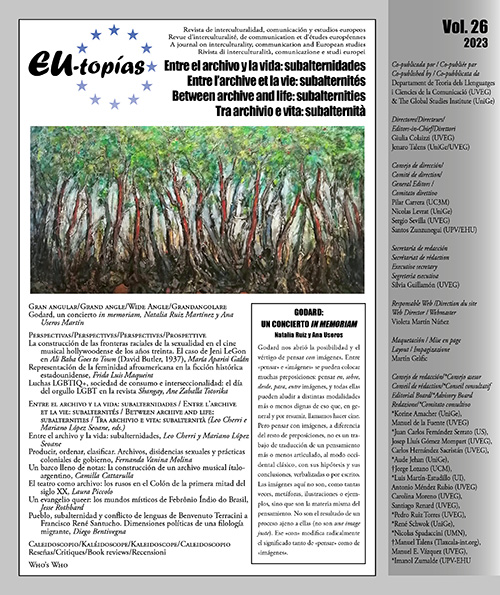People, subalternity and language conflict from Benvenuto Terracini to Francisco René Santucho. Political dimensions of a migrant philology
DOI:
https://doi.org/10.7203/eutopias.26.27533Keywords:
Subalternidad, conflicto de lenguas, filología migrante, ideas de pueblo. Abstract
Abstract
In this work we focus on the treatment of the problem of subalternity and linguistic heterogeneity in some texts written by migrant thinkers who participated in different ways in the field of philology and who, at different times, operated in Latin America. We refer, on the one hand, to the Italian Benvenuto Terracini, with university linguistic training who resided in Tucumán between 1941 and 1947 as a consequence of the implementation of racial laws in Italy in 1938. We especially deal with some passages of his book Conflicts of languages and culture, which emphasizes the problem of contact between languages as a clash of cultures and world conceptions. After establishing a dialogue between Terracini’s positions and that of other figures of political and philological thought contemporary to him such as Antonio Gramsci and Erich Auerbach, we consider some texts on languages by Francisco René Santucho, written during his exile in Peru and Bolivia at the beginning of the seventies. We establish a dialogue between Terracini’s and Santucho’s positions on the basis of a conflictive conception -eminently political- of the linguistic given that both raise.
 Downloads
Downloads
 References
References
Agamben, Giorgio. Medios sin fin. Trad. de A. Gimeno. Valencia: Pre-Textos.
Agamben, Giorgio. Stasis. La guerra civil como paradigma político. Trad. de R. Molina Zavalía. Buenos Aires: Adriana Hidalgo.
Antelo, Raúl (2016). Archifilologías latinoamericanas. Lecturas tras el agotamiento. Villa María: Eduvim, 2016.
Apter, Emily. «Global translatio. The «invention » of Comparative Literature, Istanbul, 1933», Critical Inquiry, vol. 29, n. 2, 2003, pp. 253-281.
Auerbach, Erich. Mímesis. La representación de la realidad en la literatura occidental. Trad. de I. Villanueva y E. Imaz. México: Fondo de Cultura Económica, 2006.
Arnoux, Elvira. Los discursos sobre la nación y el lenguaje en la formación del Estado (Chile, 1842-1862). Un estudio glotopolítico. Buenos Aires: Santiago Arcos, 2006.
Barros Casares, Manuel, «Introducción» a E. Auerbach, «Vico y el historicismo estético», en Cuadernos sobre Vico, n. 34, Universidad de Sevilla, 2020, pp. 23-47.
Bentivegna, Diego. «Poliglofías americanas: Fantasmagorías glotopolíticas en Ricardo Rojas y Roberto Lehmann-Nitsche», en Glotoppol. Revue de sociolinguistique en ligne, Rouen, n. 32, julio de 2019.
Bentivegna, Diego (2021), «Benvenuto Terracini: lenguas y estilo. El texto literario desde la perspectiva del exilio», en ALEA, Río de Janeiro, vol. 23/2, 2021, pp. 144-160.
Corti, Maria. «Introduzione», en Benvenuto Terracini. Conflitti di lingua e di cultura. Turín: Einaudi, 1996, pp. 3-15.
Croce, Benedetto y Karl Vossler. Epistolario. Buenos Aires: Kraft, 1956.
De Laude, Silvia. «Pasolini, Gramsci, Contini. Sul Piccolo allegato stravagante della Divina Mimesis», en P. Desogus (ed.), Il Gramsci di Pasolini. Lingua, leteratura e ideologia. Venecia: Marsilio. Pp. 179-205.
De Mauro, Tullio. Idee e ricerche linguistiche nella cultura italiana. Bolonia, Il mulino, 1980.
Dimensión. Revista de cultura y crítica. Buenos Aires - Santiago del Estero: Biblioteca Nacional, Secretaría de Cultura de la Provincia, 2016.
Esposito, Roberto. Pensamiento viviente. Origen y actualidad de la filosofía italiana. Trad. M. T. D´Meza. Buenos Aires: Amorrortu, 2015.
Gentile, Giovanni. Studi vichiani. Ed. de V. Bellezza. Florencia: Sansoni, 1968.
Ginzburg, Carlo. El hilo y las huellas. Lo verdadero, lo falso, lo ficticio. Trad: L. Padilla López. México: Fondo de Cultura Económica, 2010.
Gómez, César. Estudio preliminar, en Francisco René Santucho, Obras completas, Santiago del Estero, Barco edita - Dimensión, 2016, pp. 11-54.
Gramsci, Antonio. Lettere dal carcere. Ed. de S. Caprioglio y E. Fubini. Turín: Einaudi, 1965.
Gramsci, Antonio. Escritos sobre el lenguaje. Ed. de D. Bentivegna. Sáenz Peña: Eduntref, 2013.
Link, Daniel. «Pedro Henríquez Ureña: filología y comparatismo», en L. Funes (comp.), Hispanismos del mundo. Diálogos y debates en (y desde el sur). Buenos Aires: Miño y Dávila, 2015, pp.245-258.
Lo Piparo, Franco. Il professor Gramsci e Wittgenstein. Il linguaggio e il potere. Roma: Donzelli, 2014.
Lucchini, Guido. Tra linguistica e stilistica. Percorsi di autore. Auerbach, Spitzer, Terracini. Padua: Esedra, 2019.
Mondragón, Rafael. Un arte radical de la lectura. Constelaciones de la filología latinoamericana. México: UNAM, 2019.
Pasolini, Pier Paolo. Saggi sulla letteratura e sull´arte. Ed. de W. Siti y S. De Laude. Milán: Mondadori, 2008.
Santucho, Francisco René. Obras completas. Santiago del Estero: Barco Edita- Dimensión, 2016.
Santucho, Mario Antonio. «Las intuiciones de un «cacique» del siglo XX. Apuntes sobre el pensamiento de Francisco René Santucho», en Francisco René Santucho, Obras completas. Santiago del Estero: Barco Edita- Dimensión, pp. 21-32.
Segre, Cesare. «La letteratura: teoría e problemi». En: Elisabetta Soletti (ed.). Benvenuto Terracini nel centenario della nascita. Atti del Convegno. Torino, 5-6. Dicembre 1986. Alessandria: Edizioni dell´orso, 1989, pp. 127-135.
Terracini, Benvenuto. «Matteo Bartoli», Belfagor, Florencia, v. 2, n. 3, 1948, pp. 315-325.
Terracini, Benvenuto. Conflictos de lenguas y de cultura. Buenos Aires: Imán, 1951.
Terracini, Lore. «Relaciones entre Benvenuto Terracini y Amado Alonso», en Lexis, Lima, Vol. 20, nrs. 1-2, 1996, pp. 43-61.
Downloads
Published
How to Cite
-
Abstract221
-
PDF (Español)78
Issue
Section
License
![]()
The authors conserve the copyright. All content published in EU-topías. Journal of interculturality, Communication, and European Studies are subject to the license Creative Commons Attribution-NonCommercial-ShareAlike 4.0 license. The full text of the license can be found at <http://creativecommons.org/licenses/by-nc-sa/4.0>
They may be copied, used, disseminated, transmitted and publicly displayed, provided that:
- The authorship and original source of the publication is cited (journal, publisher and URL of the work).
- They are not used for commercial purposes.
- The existence and specifications of this license of use are mentioned.
It is the responsibility of the authors to obtain the necessary permissions for images that are subject to copyright.



